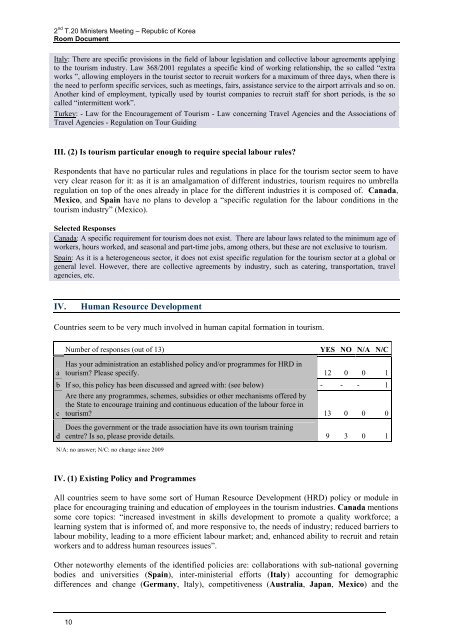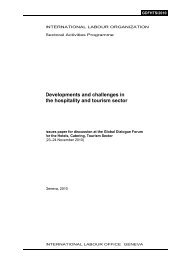Questionnaire on Tourism and Employment: Overview of Results
Questionnaire on Tourism and Employment: Overview of Results
Questionnaire on Tourism and Employment: Overview of Results
Create successful ePaper yourself
Turn your PDF publications into a flip-book with our unique Google optimized e-Paper software.
2 nd T.20 Ministers Meeting – Republic <strong>of</strong> Korea<br />
Room Document<br />
Italy: There are specific provisi<strong>on</strong>s in the field <strong>of</strong> labour legislati<strong>on</strong> <strong>and</strong> collective labour agreements applying<br />
to the tourism industry. Law 368/2001 regulates a specific kind <strong>of</strong> working relati<strong>on</strong>ship, the so called “extra<br />
works ”, allowing employers in the tourist sector to recruit workers for a maximum <strong>of</strong> three days, when there is<br />
the need to perform specific services, such as meetings, fairs, assistance service to the airport arrivals <strong>and</strong> so <strong>on</strong>.<br />
Another kind <strong>of</strong> employment, typically used by tourist companies to recruit staff for short periods, is the so<br />
called “intermittent work”.<br />
Turkey: - Law for the Encouragement <strong>of</strong> <strong>Tourism</strong> - Law c<strong>on</strong>cerning Travel Agencies <strong>and</strong> the Associati<strong>on</strong>s <strong>of</strong><br />
Travel Agencies - Regulati<strong>on</strong> <strong>on</strong> Tour Guiding<br />
III. (2) Is tourism particular enough to require special labour rules?<br />
Resp<strong>on</strong>dents that have no particular rules <strong>and</strong> regulati<strong>on</strong>s in place for the tourism sector seem to have<br />
very clear reas<strong>on</strong> for it: as it is an amalgamati<strong>on</strong> <strong>of</strong> different industries, tourism requires no umbrella<br />
regulati<strong>on</strong> <strong>on</strong> top <strong>of</strong> the <strong>on</strong>es already in place for the different industries it is composed <strong>of</strong>. Canada,<br />
Mexico, <strong>and</strong> Spain have no plans to develop a “specific regulati<strong>on</strong> for the labour c<strong>on</strong>diti<strong>on</strong>s in the<br />
tourism industry” (Mexico).<br />
Selected Resp<strong>on</strong>ses<br />
Canada: A specific requirement for tourism does not exist. There are labour laws related to the minimum age <strong>of</strong><br />
workers, hours worked, <strong>and</strong> seas<strong>on</strong>al <strong>and</strong> part-time jobs, am<strong>on</strong>g others, but these are not exclusive to tourism.<br />
Spain: As it is a heterogeneous sector, it does not exist specific regulati<strong>on</strong> for the tourism sector at a global or<br />
general level. However, there are collective agreements by industry, such as catering, transportati<strong>on</strong>, travel<br />
agencies, etc.<br />
IV. Human Resource Development<br />
Countries seem to be very much involved in human capital formati<strong>on</strong> in tourism.<br />
Number <strong>of</strong> resp<strong>on</strong>ses (out <strong>of</strong> 13) YES NO N/A N/C<br />
a<br />
Has your administrati<strong>on</strong> an established policy <strong>and</strong>/or programmes for HRD in<br />
tourism? Please specify. 12 0 0 1<br />
b If so, this policy has been discussed <strong>and</strong> agreed with: (see below)<br />
Are there any programmes, schemes, subsidies or other mechanisms <strong>of</strong>fered by<br />
the State to encourage training <strong>and</strong> c<strong>on</strong>tinuous educati<strong>on</strong> <strong>of</strong> the labour force in<br />
- - - 1<br />
c tourism? 13 0 0 0<br />
d<br />
Does the government or the trade associati<strong>on</strong> have its own tourism training<br />
centre? Is so, please provide details. 9 3 0 1<br />
N/A: no answer; N/C: no change since 2009<br />
IV. (1) Existing Policy <strong>and</strong> Programmes<br />
All countries seem to have some sort <strong>of</strong> Human Resource Development (HRD) policy or module in<br />
place for encouraging training <strong>and</strong> educati<strong>on</strong> <strong>of</strong> employees in the tourism industries. Canada menti<strong>on</strong>s<br />
some core topics: “increased investment in skills development to promote a quality workforce; a<br />
learning system that is informed <strong>of</strong>, <strong>and</strong> more resp<strong>on</strong>sive to, the needs <strong>of</strong> industry; reduced barriers to<br />
labour mobility, leading to a more efficient labour market; <strong>and</strong>, enhanced ability to recruit <strong>and</strong> retain<br />
workers <strong>and</strong> to address human resources issues”.<br />
Other noteworthy elements <strong>of</strong> the identified policies are: collaborati<strong>on</strong>s with sub-nati<strong>on</strong>al governing<br />
bodies <strong>and</strong> universities (Spain), inter-ministerial efforts (Italy) accounting for demographic<br />
differences <strong>and</strong> change (Germany, Italy), competitiveness (Australia, Japan, Mexico) <strong>and</strong> the<br />
10



